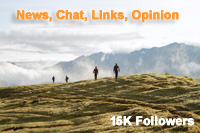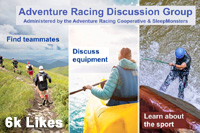Lots To Think About After The Race Briefing
Rob Howard / 06.11.2018



As teams checked in for today’s race briefing they were given 3 sheets of paper with a course profile, a summary of the stages and a breakdown of where gear bags and boxes would need to be around the course. This is what they would need to understand the briefing and to prepare their boxes ready for tomorrow.
Up until this point they’d had no real information on the race, now what lay ahead was summarised on the papers they were studying. The notes for the stage one trek made for a sobering start ... 106km/7620 ascent/8410 descent, fastest time 30 hrs 10 mins and slowest time 62 hours. And that’s just stage one!
Races are often decided by big treks, but usually later in the course. Here teams know they face one of the hardest stages from the start line, and for some it will be make or break. (There is a cut-off at TA1.)
Before teams could really digest the information the briefing began and several times the Race Directors stressed that teams needed to pace themselves to finish the course. The general information they were given covered the use of ropes (strictly one per team), and advice to stay on paths because, “cutting off the path through the vegetation is ... almost impossible.”
They were told the race would only supply drinking water at one point, and advised to carry up to 5 litres at times. At the same time they were told to camp 8m above rivers if they camped for the night in case of flash floods and that one area they will cross holds all the world records for the most rainfall (6, 12, 24, 72 hours). In other words it will most likely be dry but if it rains it could be very, very wet!
They were also told to protect themselves from heat and sunburn, but that it could be freezing on the tops and to be prepared for that as well.
There were water safety briefings advising them to carry rafts around any rapids they were unsure of and to follow instructions on the river descents if the course had to be changed. The sea kayaking will be outside the reefs and they were advised to stay 500m offshore due to big breakers and currents, stay together and that night travel is forbidden.
When he heard this Nick Gracie said, “We went to the beach to swim this morning and were told it’s not allowed due to shark attacks ... but kayaking seems to be OK.” Bjorn Rydvall said, “We were surprised to hear this – we didn’t expect to be on the open ocean.”
There are environmental issues affecting the course, and in one area teams will have to dismount and push bikes, changing to trekking shoes to do so. The warnings were strict about any infringements of rules relating to the environment: “You will be out of the race immediately”.
Sleep was discussed too and this will be complex and could be critical. Teams have to sleep 12 hours during the race, and take this time at any manned checkpoint or transition area. (So if they stop and sleep elsewhere it does not count towards their 12 hours.) The race leaderboard and tracking map will be logging how much sleep teams have had.)
They can also only count 4 hours at any one time. So, if they are caught by a dark zone and stop at a checkpoint for 8 hours, only 4 hours will be taken off their sleep clock. All the water stages will have dark zones (for 11 hours), so teams will need to plan how best to manage their sleep stops in a way which loses them least time. It will get very tactical.
All of the leading teams I spoke to looked at the rafting on stage 2 and thought that the timing for this was key. Haglofs Silva worked out that the fastest predicted time for the first trek would get them to the rafting at dusk. Should they move fast on stage one (with the risk that entails) and hope to complete some of the rafting and get to a CP to sleep the night? The risk is that if they have to stop anywhere else when darkness falls, then none of the time overnight will count towards their 12 hours mandatory sleep.)
Or should they take a more cautious approach to conserve their energy and plan to finish stage one during the night, then rest at the transition before starting the rafting. The problem with that is the minimum time given for the rafting stage is 14 hours 15 minutes ... and there is only 13 hours of daylight. So teams could get caught in two dark zones on the one stage.
As always on an expedition race it was a lot of information to take in and teams then had to go back to their chalets to start the final pack of their gear boxes. They will have to hand them over in the morning before taking the buses to Hell-Bourg for the prologue stage tomorrow. The race then starts at 6am the following day (Nov. 8th), so they will have plenty of time to think and plan before the race begins.









 SleepMonsters
SleepMonsters



